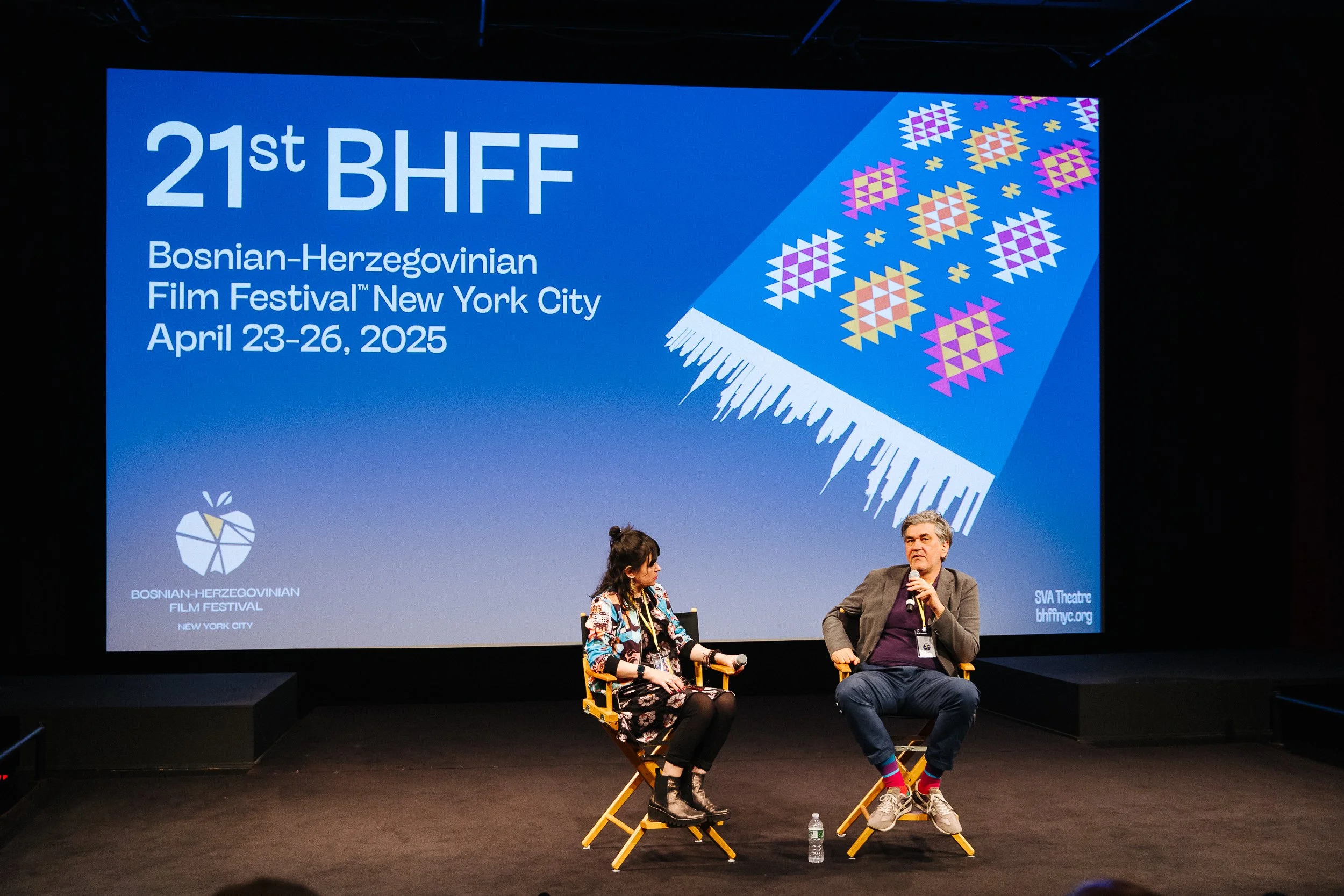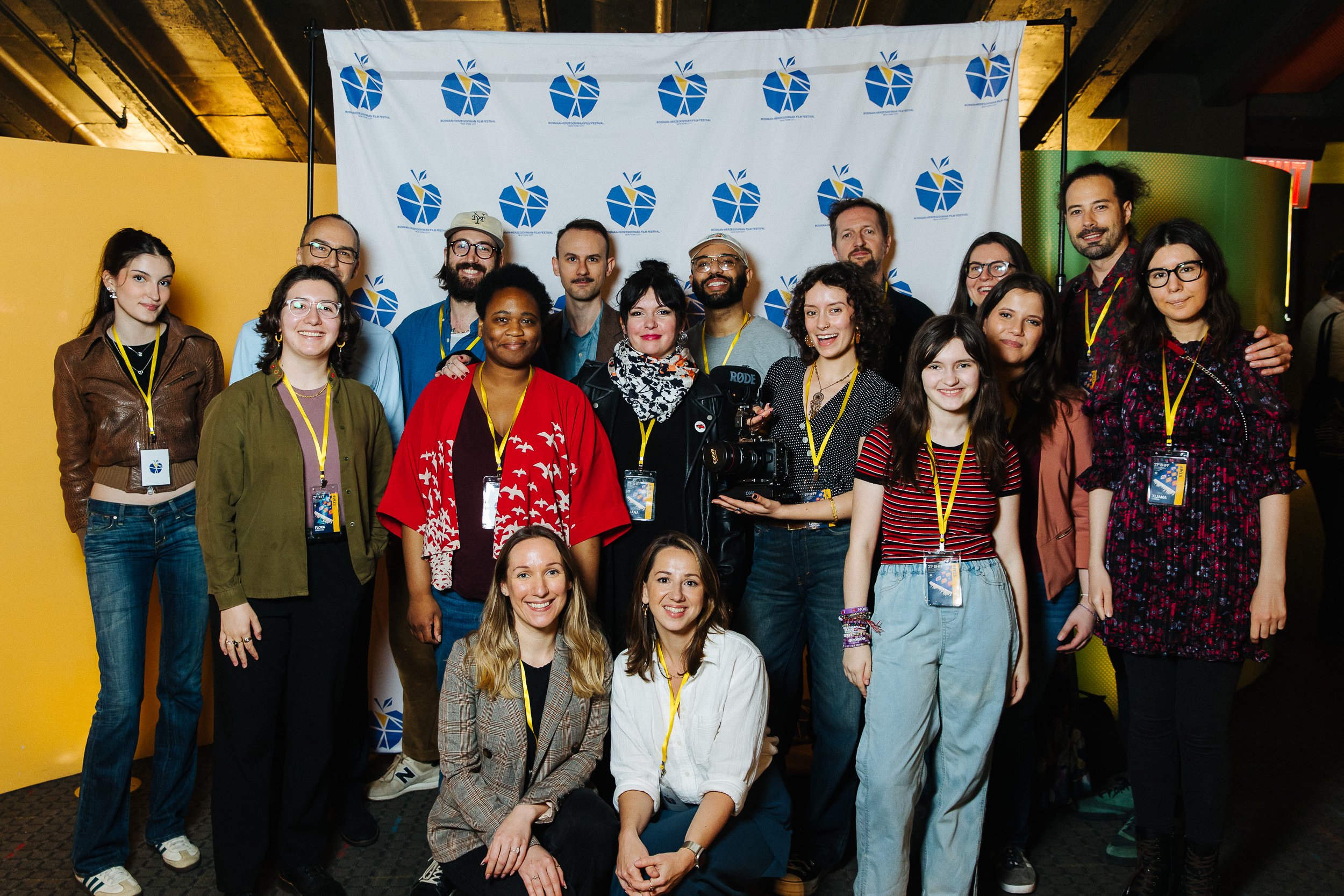Hard Work and Good People: Helping Sell-Out the 2025 Bosnian-Herzegovinian Film Festival
Introducing Presentation 3
I’ve always been very proud of my Bosnian roots, and have always held on to that piece of myself and my history. When I moved to New York City back in 2019, I was overjoyed to find the Bosnian-Herzegovinian Film Festival, bringing modern Bosnian Cinema to NYC. That sparked the drive for me to attend every year and even, for this year’s iteration, volunteering with the festival itself.
Since the festival is entirely volunteer-run, we were able to contribute cross-departmentally. That means that even though I was officially considered a programming assistant and the on-site social media manager, I was able to help out in many different ways. My biggest point of pride is that this year’s festival was the most attended in its history, and we all had helped out by reaching out to our network, mine being NYWIFT and my old acting school.
In terms of the films, it was a very high-quality program that we had going for us. We had films that spanned the whole range of Bosnian cinema, from up-and-coming student films to films directed by Oscar-winning and Oscar-nominated directors. I am extremely proud of the program we put together.
Day 1
The first day of the festival aptly started with Presentation 1, featuring the short film “This Was a Graffiti” by Ukrainian-born Sarajevo resident Valeriya Boyko and the North American premiere for the feature narrative film “Gym” by Srdan Vuletić, followed by a Q&A with Srdan Vuletić.
“This Was a Graffiti” tells the story of a piece of graffiti that had turned up on the side of the post office in Sarajevo during the war in the 90s. “This is Serbia” it read, and then, underneath, someone had added “This is a Post Office, idiot.” This short takes a dive into the nationalism that was present during that time, and how the people of Sarajevo responded with the typical Sarajevan humor, keeping hope alive in a dark time.
“Gym” tells the fictional story of Riki and his friend, who both work for a struggling catering company. Riki’s friend somehow believes that by beating up the owner’s ex-wife, that will be the key to the company’s success. This film addresses the topic of violence against women that is prevalent throughout the world, but further criticizes society’s lack of action even when the warning signs are so obvious.
The Q&A with Srdan Vuletić, the director of “Gym,” further dove into the themes he was addressing with his film. It was refreshing and heartening to see such a well-known and well-respected figure in Bosnian cinema taking a no-holds-barred stance against femicide and violence against women, and calling for changes to be made in our society.
Uliks Fehmiu signs the movie poster for My Late Summer
Day 2
The second day of the festival also only had one presentation. Presentation 2 showed the feature narrative film “My Late Summer” by Oscar-winning director Danis Tanović, followed by a Q&A with the lead actor Uliks Fehmiu.
This was the North American premiere for “My Late Summer” but it was really refreshing to see a film that takes place on an island in the Adriatic. We don’t often see the seaside parts of the Balkans, which are incredibly beautiful, so it was nice to see another part of the region depicted so prominently. This was also a very intimate and funny film, a nice break from the dark themes of post-war Bosnian cinema.
Day 3
The third day of the festival had Presentations 3 and 4.
Presentation 3 showed the Oscar-nominated short narrative film “The Man Who Could Not Remain Silent” by Nebojša Slijepčević and the feature narrative film “At the Door of the House, Who Will Come Knocking” by Maja Novaković.
“The Man Who Could Not Remain Silent” is set in 1993. A passenger train is stopped by paramilitary forces in an ethnic cleansing operation. As they haul off innocent civilians, only one man out of 500 passengers dares to stand up to them. “At the Door of the House, Who Will Come Knocking” takes places in the harsh winter landscape of Bosnia, and follows the day-to-day life of an old man living in isolation. Both of these films were quite emotional, and I think true cinephiles would appreciate them.
Presentation 4 was an incredibly emotional one for me.
Ado Hasanović takes a bow
It was the North American premiere for the feature-length documentary film “My Father’s Diaries” by Ado Hasanović. We have many films in this world about Srebrenica – the worst massacre during the Bosnian War and the worst atrocity in Europe since WWII – but this is the first documentary film told from inside Srebrenica in real-time as war gets worse, the city gets encircled, and the people get marched away. It is a intimate story, because it is based off the clips taken during the war by Ado’s father. I highly recommend for everyone to watch it if they get the chance
Day 4 – Final Day!
Presentation 5 was the student shorts block. It featured “Good Luck, Sara” by Isidora Ratković, “Tomorrow We Will Buy the Fish” by Sara Ristić, “All Because of a Bull” by Emir Solaković, and “Zanzibar Colorized 4k” by Lea Tošić.
I was incredibly impressed by the quality of work for these films and it filled me with so much hope and joy to see what the future of Bosnian Cinema might look like.
Presentation 6 showed the feature-length documentary by Oscar-nominated director Jasmila Žbanić, “Blum: Masters of their Own Destiny.” Synopsis: “Jasmila Žbanić’s documentary sheds light on an extraordinary historical figure, Emerik Blum. A Bosnian Jew of Hungarian descent, Blum managed in 1944 to escape two of the most notorious concentration camps run by the Croatian fascist Ustaše. He thrived during the early postwar years of Marshal Tito’s Yugoslavia by ascending to top ministerial positions in the power sector, leading him to become the founding director of Energoinvest, one of Europe’s largest (and still-preeminent) engineering conglomerates.”
The final presentation – Presentation 7 – showed the feature narrative film “When Santa Was a Communist” by Emir Kapetanović. This film was equally as heartwarming as it was heartbreaking. It tells the story of a troupe of actors trying to bring holiday joy to a religiously divided country.
Overall, the festival was a huge success. I got see some amazing films, meet plenty of new people, and participate in a wonderful process. Can’t wait to do it again!
List of Winners:
BHFF Jury Award for Best Feature: My Late Summer by Danis Tanović
BHFF Jury Award for Best Documentary: My Father’s Diaries by Ado Hasanović
BHFF Jury Award for Best Short Narrative: Good Luck Sara by Isidora Ratković
BHFF 2025 Audience Award: My Father’s Diaries by Ado Hasanović
BHFF Jury Special Mention: Gym by Srdan Vuletić
BHFF Jury Special Mention: All Because of a Bull by Emir Solaković
BHFF Jury Award for Best Acting Performance: Dina Mušanović for her role in Good Luck Sara
xx,
Selma
The BHFF volunteer team!


